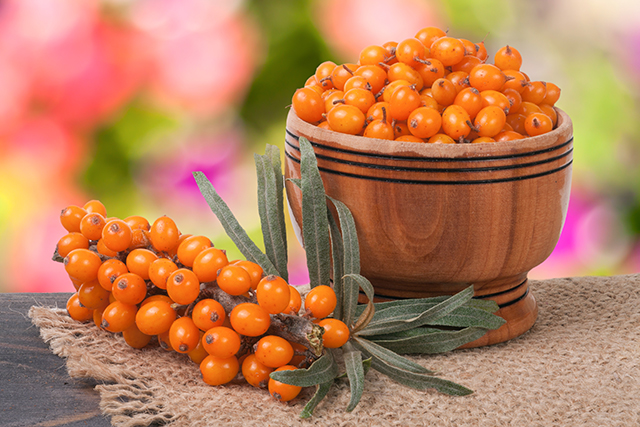
Advertisement
You may know sea buckthorn (Hippophae rhamnoides) by another name, seaberry — a hardy, flowering shrub that produces yellow- to orange-colored berries. These berries are highly nutritious, boasting large amounts of antioxidant vitamins A, C and E, as well as some B vitamins. Like carrots, the bright-orange color of sea buckthorn berries is also indicative of their high carotenoid content. Carotenoids, which include lycopene, beta-carotene, lutein and zeaxanthin, are beneficial plant nutrients that promote eye health, enhance immunity and protect cells from disease-causing oxidative damage.
Because of their high nutrient content, sea buckthorn berries are often used as functional foods. They can be found crushed into jams, dried and sold as health ingredients, made into tea or cold-pressed to produce an edible oil that can be used for cooking. Sea buckthorn oil, depending on which part (e.g., seeds, pulp or berries) it was extracted from, can vary in terms of color, aroma and nutrition value. Nevertheless, it is one of the most versatile and nutritious oils you can ever find on the market today.
The different uses of sea buckthorn oil
Sea buckthorn oil is known for its not-so-engaging smell. Some would describe it as the smell of moist wood, which may be perfectly tolerable for others but unpleasant for some. But despite its difference from other, more popular essential oils, sea buckthorn oil is still commonly used in vaporizers and oil burners.
Perhaps the most popular use for sea buckthorn oil is as a skin remedy. With its mixture of antioxidants, anti-inflammatory chemicals and moisturizing fatty acids, this unique oil is a great anti-aging ingredient. You can find sea buckthorn oil in many skincare products that promise to lighten the appearance of wrinkles and other signs of aging. In addition, sea buckthorn oil also makes a great remedy for acne and other skin disorders.
One of the properties that define sea buckthorn oil is its alkalinity. When consumed, this alkalinity allows it to counteract the reaction of acids, which is great for treating mouth ulcers, heartburn and acid reflux. Sea buckthorn oil is also blessed with high bioavailability and abundant anti-inflammatory compounds — a winning combination for treating peptic ulcers. As an added bonus, sea buckthorn oil can speed up your metabolism, which is really helpful if you’re planning on losing weight.
Sea buckthorn oil also works exceptionally well for coughs, especially when they involve sticky phlegm. Taking sea buckthorn oil helps loosen phlegm so you can easily expel it from your throat. In a similar way, it also works for nasal congestion. Other notable uses for sea buckthorn oil include as an antiseptic for cleaning wounds and as topical medicine that accelerates the healing of abrasions, scratches, cuts or scrapes.
Scientific discoveries about sea buckthorn oil
In an article recently published in the Journal of Ethnopharmacology, Beata Olas, a professor at the University of Lodz in Poland, reviewed the health benefits of sea buckthorn seed and pulp oil. Olas looked at previous studies that involved both animals and humans and summarized all of their findings.
Here are some of the remarkable things about sea buckthorn oil that Olas included in his paper:
- Sea buckthorn is a valuable component of human and animal nutrition, thanks to its abundance in health-promoting substances.
- These phytonutrients can be found in various parts of the plant, such as its oil, berries, leaves and bark. The different parts of sea buckthorn also serve as raw materials for health foods and nutritional supplements.
- The mature seeds of sea buckthorn contain up to 20 percent oil. The dried fruit pulp contains 20 to 25 percent oil, while the fruit residue contains about 15 to 20 percent oil after juice extraction.
- Sea buckthorn oil contains high amounts of unsaturated fatty acids, which are considered healthy fats; plant sterols; and vitamins A and E. These nutrients all play important roles in maintaining human health.
- The unsaturated fatty acids in sea buckthorn oil are beneficial for people with cerebrovascular and cardiovascular diseases. These healthy fats have antioxidant, anti-inflammatory and anti-depressive properties.
- Besides unsaturated fatty acids, sea buckthorn oil also contains plenty of plant sterols — particularly beta-sitosterol — that are good for the heart.
- In a 2015 study, researchers found that sea buckthorn oil can protect the liver of rabbits against oxidative damage caused by the oxidation of fats.
- Some studies also suggested that sea buckthorn oil has anti-cancer properties, but this needs to be further explored and verified in future studies.
Sea buckthorn oil is a versatile and nutrient-rich oil that you can use in a variety of ways. When added to food, it can help you meet some of your nutritional requirements and relieve some digestive issues. When used topically, sea buckthorn oil can address different kinds of skin problems and keep your skin looking young and healthy.
Although not native to the U.S., sea buckthorn is hardy, easy to grow and resistant to pests and disease. Its medicinal applications and nutritional value also make it a wonderful addition to any home garden.
Check out other useful plants to have in your backyard at GrowYourMedicine.com.
Sources:
Advertisements







